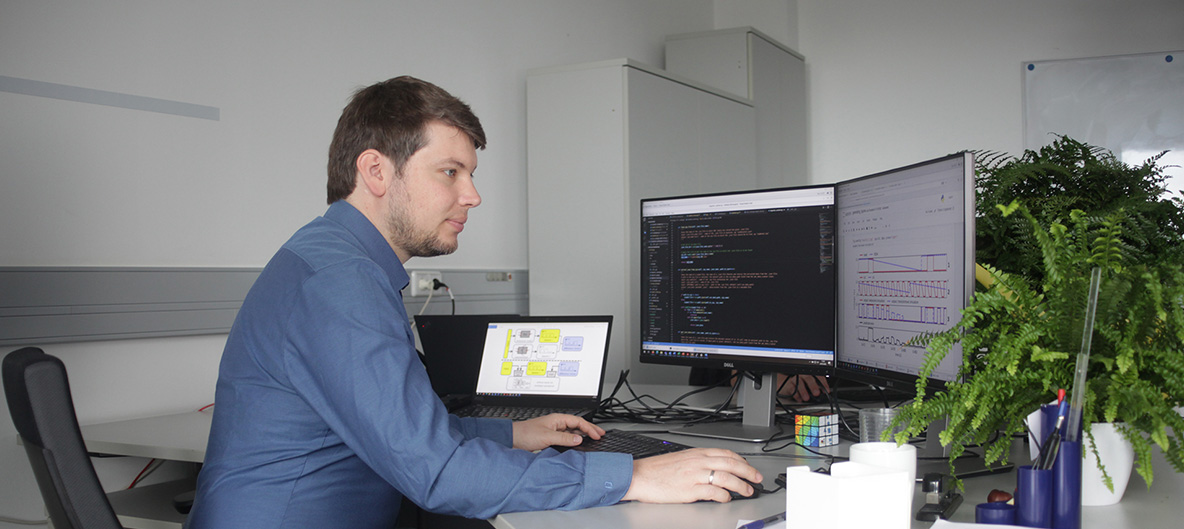

Machine learning based prediction of critical paths in digital circuits
During your studies, you can contribute to our ongoing research projects. Join us in pushing the limits of what is technically feasible and be part of breaking new ground together. We offer a variety of challenging and practice-oriented topics for mandatory internships, Bachelor’s or Master’s theses or for student research assistants. You will analyse important scientific preliminary questions and support the project teams with development activities.
Place of work: Erfurt
Team: Microelectronics
Career level: Mandatory Internship, Thesis or Student Research Assistant
Research field: Integrated sensor systems
Time scope: By agreement
Start: As soon as possible
Application deadline: 2024-12-31
Reference number: IMMS_STUD_ME_0523
The design of digital circuits and systems is similar to software design: The behavior of the target circuit is described by means of source code in a hardware description language. This description is afterwards translated, synthesized in boolean logic and finally to a chip layout or FPGA bitstream.
Still, the maximum clock frequency/speed, the area or ressource usage and the power consumption can only be predicted after this lengthy synthesis process. Especially in systems requiring high clock frequencies, this often leads to design iterations if the target speed cannot be met, i.e. the logic get too long. The emerging critical paths have therefore tob e found in the code and relaxed or refactored. If the overall synthesis time is in range of hours or day (which is quite common), this process causes a lot of effort and delay.
This thesis aims at estimating the critical paths in a very early stage in the design process. The code should be analyzed by the free synthesis tool yosys resulting in a (data-flow) graph representation. This graph is then to be rated using a machine learning algorithm to make the critical paths visible in the code. For generating the training data, the commercial synthesis processes are available and can be used.
Finally, a tool for the automated processing of verilog code is to be created.
WHAT TO DO:
- Conceptual design of the machine learning algorithm
- Generation of training data with the existing flow based on open hardware designs
- Realization, training and evaluation of the machine learning system
- Documentation
WHAT TO BRING WITH YOU:
- Design of FPGA-Systems of advantage
- Programming in Python
- Experience with machine learning methods (CNNs, Tensorflow,…)
AND THIS IS US:
We strengthen enterprises with application-oriented research and development in microelectronics, systems engineering and mechatronics and transfer the results of basic research into applications and products. We support companies in launching internationally successful innovations for health, the environment and industry and provide solutions from the feasibility study to series production.
WE ARE LOOKING FORWARD TO MEETING YOU!
We thank you for your interest in working with us.
WHAT CAN WE OFFER YOU:
- An attractive workplace in a modern, very well-equipped and industry-oriented research institute
- Work directly at the interface between university and industry
- Work in a flexible and creative team and on innovative and challenging topics
For the tasks described in the job offer and with the existing working conditions, an application is possible irrespective of gender and/or any physical disabilities. We foster professional equality of women and men. We invite women in particular to apply. As women are underrepresented at IMMS, they will be given priority in the case of equal suitability, ability and professional performance.
Address:
IMMS Institut für Mikroelektronik- und Mechatronik-Systeme gemeinnützige GmbH (IMMS GmbH)
Ehrenbergstraße 27
98693 Ilmenau
Germany
Contact: Eric Schäfer



 Print
Print